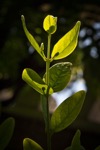| Scientific: | Peumus boldus |
|---|---|
| Other: | Boldo |
| Family: | Monimiaceae |
Boldo trees grow in Chili and surrounding countries. Locals use the leaves to make a fragrant tea to promote digestion and treat indigestion. Extracts contain essential oils and isoquinoline alkaloids (boldine) that fight infections, reduce cramping pains and increase bile flow. Western herbalists use boldo for digestive conditions and in particular to dissolve gallstones and relieve biliary pain. Its antimicrobial compounds make it beneficial for colds, pneumonia, and urinary tract infection.
Hepatobiliary
• biliary insufficiency
- cholelithiasis (gallstones) - primary use
- cholecystitis
- biliary dyskinesia
Gastrointestinal
• poor digestive tone - lack of appetite - dyspepsia- hypochlorhydria
Dermatologic
• chronic skin conditions associated with poor digestion and elimination causing 'bad blood'
- hives
- psoriasis
- acne
Urinary
• urinary tract infections (UTI)
• urethritis
• nephrolithiasis
Infection
• bacterial
• fungal
• Antilithic
• Alterative
• Bitter
• Stomachic
• Hepatic
• Cholagogue
• Choleretic
• Antimicrobial
• Antibacterial
• Antifungal
• Antiparasitic
• Antileishmanial
• Antiinflammatory
• Hepatoprotective
• Laxative (Mild)
• Emmenagogue
• Isoquinoline Alkaloids (E.g. Boldine)
• Essential Oils (E.g. Ascaridole, Terpin-4-Ol )
• Tincture (1:5 in 60% EtOH): 1-2 ml tid
• Infusion (herb): 1 tsp tid
Contraindications: Pregnancy and lactation (uterine stimulant); berberine is considered teratogenic. Kidney disease.
Caution: Gastritis, peptic ulcers.
Toxicity: Volatile oils are very toxic.
Long-term use: Hepatotoxicity; monitor liver function.
Liver toxicity: Consider monitoring liver function if used long-term or with pre-existing liver disease.
Drug-induced hepatitis: Reported cases (due to isoquinoline alkaloid exposure).
Gastritis, peptic ulcers: Stimulation of gastric secretions can irritate inflamed mucous membranes; concomitant ingestion of demulcent herbs can help prevent aggravation.
Barnes J, Anderson LA, Phillipson JD. Herbal Medicines, 3rd ed. London: Pharmaceutical Press, 2007.
Bone K. Principles and Practice of Phytotherapy. Edinburgh: Churchill Livingstone, 2000.
Bone K. A Clinical Guide to Blending Liquid Herbs: Herbal Formulations for the Individual Patient. St Louis, MO: Churchill Livingstone, 2003.
Brinker F. The Toxicology of Botanical Medicines, 3rd ed. Sandy, Oregon: Eclectic Medical Publications, 2000.
Felter HW, Lloyd JU. King's American Dispensatory. 1898. http://www.ibiblio.org/herbmed/eclectic/kings/main.html. Accessed: August 19, 2006.
Hoffman D. Medical Herbalism. Rochester, Vermont: Healing Arts Press, 2003.
Weiss RF. Herbal Medicine. Beaconsfield, England: Beaconsfield Publishers Ltd, 1988.
Williamson EM, ed. Major Herbs of Ayurveda. Edinburgh: Churchill Livingstone, 2002
Disclaimer: This content is subject to change. The information is intended to inform and educate; it does not replace the medical evaluation, advice, diagnosis or treatment by a healthcare professional. www.nhpassist.com © 2014 NDAssist Inc. and/or its affiliates. All rights reserved.

|
Boldo
SummaryBoldo trees grow in Chili and surrounding countries. Locals use the leaves to make a fragrant tea to promote digestion and treat indigestion. Extracts contain essential oils and isoquinoline alkaloids (boldine) that fight infections, reduce cramping pains and increase bile flow. Western herbalists use boldo for digestive conditions and in particular to dissolve gallstones and relieve biliary pain. Its antimicrobial compounds make it beneficial for colds, pneumonia, and urinary tract infection. IndicationsSign in requiredActionsSign in requiredConstituentsSign in requiredPosologySign in requiredSafetySign in requiredReferencesSign in required |
|---|